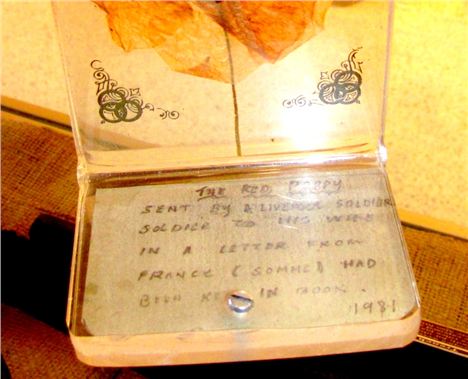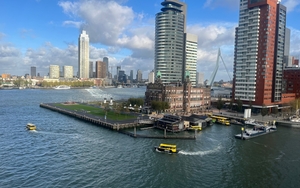AS Liverpool remembers the start of World War One, a single faded poppy, sent from the killing fields of the Somme, has gone on display for the first time.
Years before the poppy was adopted universally as a symbol of the Great War, a Liverpool soldier wrote a letter to his wife as he waited in the trenches to take his place one of humanity's bloodiest battles.
He sealed his words with a single flower, a beautiful red poppy, plucked from the dirt.
Faded poppy, sent from a soldier in the Somme trenches, to his wife in Liverpool
Like more than a million others, the fighter, unnamed, never returned from the Somme. His widow treasured the crimson petals in the pages of a book until they faded and she eventually died.
Now the flower can be seen by the public at a World War One centenery exhibition at the Florence Institute in the Dingle. It has been loaned to the Florrie by collector John Makin, from Childwall.
John, an amateur battlefield archaeologist, who has made a number of visits to the Somme to search for the tools and weapons of war, has owned the poppy leaf since 1981.
He said: “I was talking to a lady at a car boot sale in Liverpool and she told me about the poppy which she kept safe at home wrapped in a piece of cellophane. It was her sister who had received it from her husband while he was fighting in the Somme.
“It was very faded and when she knew of my interest in wartime memorabilia she asked me to take it and look after it. As she was herself quite elderly I assumed she wanted to make sure that her brother-in-law’s poppy was never forgotten. The leaf is so fragile and I have had it preserved between two pieces of acrylic.
“It is not much to look at, yet the story behind it must be enormous,” he went on.
“You can image the soldier on the Somme, probably mindful of his likely fate, writing a letter to his wife back home in Liverpool. The wild poppy would be the nearest thing he could send as a token of affection.
“The poppy has since become such a powerful symbol of the way we remember fallen soldiers. I feel very honoured to be the custodian of this lovely old poppy leaf.”
It would be 1921 before the poppy was chosen in the UK as the symbol of the millions who died. The flower grows were land has been disturbed and the shelling on the battlegrounds of France and Belgium provided just the conditions for them to flourish.
John added: “The tragedy for me is I never found out the name of the soldier who sent the poppy. It was more than 30 years ago when it was handed to me and I was new to collecting memorabilia. I suppose you could say it’s a poppy from an unknown soldier from Liverpool, and possibly one of the first poppies to be used as some kind of memory of the war.”
 The flower was pressed in the pages of a book for more than half a century
The flower was pressed in the pages of a book for more than half a century
Other items loaned to the Florrie by John include spades used to dig trenches as well as mortar shells and other relics such as horse shoes. Millions of horses perished in the battles, alongside the soldiers.
The poppy occupies a quiet space in the moving show, surrounded by artefacts. Add photographs of local people who fought and, in some cases, died in the war, and the exhibition is a powerful lesson in history.
Heritage consultant Stephanie Blundell, who has curated the exhibition, called Fighting to Survive, said: “We made an appeal for local people to loan us their war memorabilia and the response was amazing. John brought many items along including the poppy petal. For such a fragile petal to survive all of this time is remarkable, and so is the story behind it.”
*Fighting to Survive, The Florence Institute, Mill Street, Dingle, L8. 9am to 6pm daily until August 10. Admission is free.
In Flanders Fields
In Flanders fields the poppies blowBetween the crosses, row on row,
That mark our place; and in the sky
The larks, still bravely singing, fly
Scarce heard amid the guns below.
We are the Dead. Short days ago
We lived, felt dawn, saw sunset glow,
Loved and were loved, and now we lie
In Flanders fields.
Take up our quarrel with the foe:
To you from failing hands we throw
The torch; be yours to hold it high.
If ye break faith with us who die
We shall not sleep, though poppies grow
In Flanders fields.
by John McCrae, 1915













